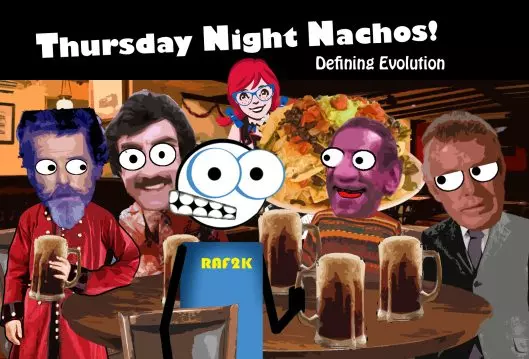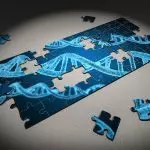The video above will sum up the key points of this chapter- in this case, why the definition of evolution needs to include an increase their chances of survival OR ability to reproduce. The full chapter, which features Rent-A-Friend and his fellow Nacho-eating arm chair philosophers, can be read below. Enjoy! #JesusLovesYou
To read other parts of this series click here
Danny’s Bar, Grill, and House of Rabblerousing was known for many things. First, as I have mentioned many a time, they have a plate of Nachos so large that, in most states, you are required to wear a helmet and safety glasses while even seated at the same table. Some nights they have live music from local bands, and every night they have darts, foosball, and unless it is covered in a buffalo wing buffet, a pool table.
Each Thursday I meet my good friends Captain Blue Beard, Bill, Tom, and Carl at our round table near the dart board. What brings us, aside from the good company and an arguably dangerous pile of Nachos is our affable and lovely waitress, Wendy.
In addition to our frosty mugs of root beer, Wendy met us this night with a scientific quandary. I had written a definition for Darwinian Evolution on 3 x 5 inch note cards and given them out to the company, including Wendy, and it was on this topic which she addressed us.
“OK, so according to this card you gave me,” she said, “Evolution is an unguided, Natural process which increases the genetic information in an organism; Creating new Genes which did not previously exist. These new genes then cause an increase in physical complexity and associated behavior, Both of which increase the organism’s ability to survive and pass on these traits to offspring.
I think most of this makes sense, but can you simplify this phrase for me? “Both of which increase the organism’s ability to survive and pass on these traits to offspring.” It’s been a long time since high school biology.”
“Certainly!” I replied with enthusiasm. “There are two major reasons which this is a necessary component of evolution.
1. Dead things don’t reproduce.
2. Things that don’t reproduce also don’t reproduce.
I hope I’m not making things too complex.”
“No,” she said with a smile. “I think I follow you so far. But, you mean to say that these new genes, features, and associated behaviors increase the organism’s ability to survive, and increase the organism’s ability to reproduce? It has to do both?”
“It has to do both,” I said.
“Why both? Why isn’t it good enough to just increase their chances of survival OR ability to reproduce?”
“Imagine that some creature, let’s say a turtle, gets a great mutation which causes it to be really fast. Fastest Turtle ever. But as a result, the female turtles think he’s a freak and refuse to mate with him.”
“Blue Beard knows how that feels, don’t you Captain?” said Tom with a grin.
“Not true!” he bellowed in return. “Many a lass has sought to catch the Captain in bonds matrimonial, but none of them have been fast enough to catch me!” He laughed heartily and drank from his frost mug of root beer. “Though I guess I do know what it feels like to be as fast as a mutant turtle.”
“So because the turtle is breaking the land speed turtle record,” Wendy said, “he’s got a better chance of surviving than other turtles, but he will have no baby turtles,” she said.
“And thus,” I said professorially, “the genes which make him El Tortuga Ayunar die with him, and no evolution occurs.”
“What if he has a mutation which makes him irresistible to girl turtles?” Wendy asked. “Isn’t a mutation which makes it more likely that you’ll reproduce good enough?”
“Not alone,” I answered. “What if he does have the Romeo gene and has, as a result, twice as many offspring as other turtles? But, what if those offspring as a result are LESS likely to live to adulthood?”
“Why would they be less likely to survive?” demanded Carl. “That’s totally ad hoc.”
“Well, perhaps the fact that they are irresistible,” I pondered, “means the adult turtles are always around them, and they get stepped on, or unable to get to food or away from predators.”
“Romeo Turtle will have more children than his brothers,” said Bill, “but will have FEWER grand-turtles than his brothers, and thus again, no evolution.”
“Or worse,” said Blue Beard. “What if Romeo Turtle’s pheromones, which make him irresistible to girl turtles ALSO attracts predators? The Romeo Gene WOULD have given him twice the offspring, but it actually results in fewer because it gets him eaten sooner! I’ve had a bad bottle or two of cologne which almost did the same for me. Although it may have been barbeque sauce…”
“So whatever the super new gene is,” said Tom, “if it’s a Romeo Gene which increases their chance of reproducing, they have to still have as much of a chance of surviving to do so.”
“Or no Evolution,” I said.
“And if it’s the Speedy gene,” said Tom, “which increases their chance of surviving to reproduce, it has to not interfere with their chances of mating.”
“Yes,” I said, “but in either case the gene cannot have any ill effect on the offspring. If the Romeo gene gets them eaten before they are old enough to mate, or if the speedy gene increases their odds of running headfirst into a wall to their own demise, the evolution still stops because the gene, while beneficial in once sense, is detrimental in another.”
“So the definition implies an increased ability to survive and reproduce into future generations,” said Bill, “not merely the first generation that gets that lucky super gene.”
“That’s right!” I said, indicating my joy by rapping my root beer against his.
“OK,” she said. “I think I get it. The most important thing, as far as this definition goes, is passing on the genes to future generations. So a gene which helps them live, but not to reproduce doesn’t do the job. And if it would help them reproduce, but doesn’t help them live long enough to do so, it still is a dead end.”
“Yeah,” I agreed. “Basically.”
“OK, thanks,” she said. “I’ll go see how your Nachos are coming.” And she headed off to the kitchen.
“So the point you’re making,” said Bill, “is that the mutation which makes new genetic information must at least NOT hinder the organism’s ability to survive and reproduce, because either would make it a harmful mutation.”
“Right,” I said. “Whether it helps or not, as long as it doesn’t hinder the individuals who carry it, those changes can stay in the population where it might be added to by the next lucky mutation, until the mutations add up to big changes or sudden death. And if you check my definition, you’ll be able to figure out that only the big changes are evolution. Sudden death, while a change in living things, is not evolution.”
“I’ve got a question about the same line in your definition,” said Tom. ““Both of which increase the organism’s ability to survive and pass on these traits to offspring.” I’ve read in various books the idea that Evolution doesn’t happen to individuals, or in an organism. Evolution happens to populations.”
“That all depends on how you define evolution,” I reminded him. “Some people define it as a change in allele frequency, which of course means you have to consider a whole population at once. No one individual organism will have a change in allele frequency. But we’re talking about the growth of the Evolutionary Tree. Making new kinds of animals requires new genes for structures and associated behaviors which they did not have before. Those would be the result of mutations adding information in a single individual which would be then passed on to its offspring, and if beneficial, become a more frequent feature in the population.”
“Then you’ve just agreed with the textbook definitions!” exclaimed Carl. “Evolution is a change in allele frequency. The new gene goes from 0% to, maybe in enough time, 100% of the population.”
“No, you have it backwards, Carl,” I said. “Evolution isn’t a change in allele frequency. Evolution, the addition of beneficial genes, would cause a change in allele frequency. It’s not a synonym. They are a cause and effect relationship.”
“Yeah,” interjected Blue Beard, “it’s like, a lifetime supply of doughnuts wouldn’t BE obesity. It would CAUSE obesity. Somethin’ like that.”
“A lifetime supply of doughnuts might both be and cause happiness,” I suggested.
“But you digress,” said Carl.
“Just as a matter of definition,” said Bill, “or rather, to make clear the definition, we should talk about how mutations would have to work to make new genes to get passed on. The process gets a little more complex when you consider how unlikely it is to not only GET a new gene, but to get it passed onto the next generation.”
“Now there I know you’re wrong,” said Carl. “Most living things have trillions of cells, and mutations are happening all of the time. Getting a beneficial mutation is just a matter of time.”
“It’s not as easy as it sounds,” said Bill. “To show the math, let’s start out by defining the two kinds of cells found in an animal or plant.
1. Somatic cell: any body cell that is not involved in reproduction.
2. Germ cell: a cell that will create reproductive cells called gametes.
Of the BILLIONS of cells you have, if the mutation which causes the creation of a beneficial new gene happens in one of the BILLIONS of cells which are Somatic cells, then nothing is gained.”
“There is a good chance that the cell that new gene is in won’t even USE that gene,” I added. Carl raised his eyebrow at me. “You’ve got 20,000 genes! Your cells don’t have time to use them all! They have to prioritize, so they find a collection of their favorites and just stick with it. You’d do the same thing, trust me.”
“Even if the cell does use that mutation,” Bill continued, “it doesn’t make any evolutionary difference because it will die with you. Changes in somatic cells are not passed on to offspring, and so don’t matter to evolution.”
“Now consider germ cells which produce gametes,” I said. “No animal or plant makes those one at a time. They tend to be made by the millions as well. So for the evolution to happen, the beneficial mutations which causes the creation of a new gene has to happen in the germ cells/gametes which happen to find the matching gametes, and not the MILLIONS of them which fail to fertilize a member of the next generation. If the lucky piece of pollen with a beneficial mutation, out of millions of pollen grains without it, just gets stuck to a spider web and doesn’t make a new plant, then the lucky mutation means nothing. It’s got to get to a flower!”
“So, some accident causes a misspelling which is actually helpful,” asked Blue Beard, “but not to the individual what it happens in? So all them comic books is wrong? I thought a useful mutation gave you super powers or something helpful like that.”
“Sorry, Captain,” said Bill. “Again, just to clarify, the new genes can’t benefit the first individual who carries it because it must be contained in a germ cell. In fact, it must be made in a germ cell. The germ cell it happens in then has a slim chance of winding up as a member of the next generation. When it DOES become a new organism, that mutation has to increase the organism’s ability to survive and pass on these traits to offspring. Meaning, the new gene created by the mutation in the parent, must help all of the subsequent organisms which carry and express the gene to survive and reproduce.”
“So if a mutation makes the speedy Romeo gene in a Turtle,” said Blue Beard, “but in one of his millions of Somatic cells, nothing happens.”
“Right,” said Bill. “He’d have one really fast cell.”
“And if the speedy Romeo gene happens in a turtle’s germ cells,” continued Blue Beard, “but the germ cell it happens in doesn’t get used making a new turtle, then the gene dies and again nothing happens.”
“Yup.”
“So in terms of your definition,” said Tom, staring at his note card, “the process which creates new genes happens in the parent, and makes new genetic information in their germ cells, which doesn’t help the parent, or change them at all.”
“Right,” I said. “Being the first carrier of the lucky new gene doesn’t help you, and doesn’t even help you pass it along to the next generation. Getting that new gene into the population and expressed as new features is truly just dumb luck.”
“T’was the idea of Darwin’s book, wasn’t it?” asked Blue Beard, tongue in cheek. “Survival of the Just Dumb Luckiest?”
“And these new genes,” continued Tom, ignoring our pirate friend, “cause an increase in physical complexity and associated behavior, both of which helps the offspring, not the parent, to survive and pass on these traits to offspring of their own.”
“That’s right. Do you think I should have said it that way?”
“I think it’s a mouthful already,” said Blue Beard staring at his own note card. “What with Tom’s additions, it would read, “Evolution is an unguided, Natural process which increases the genetic information in an organism’s germ cells; Creating new Genes, which did not previously exist, in a germ cell which is used in the creation of the next generation of organisms, so that the members of the next generation that carry the genes can express them.
These new genes then, if expressed, cause an increase in physical complexity and associated behavior, both of which helps the offspring, not the parent, to survive and pass on these traits to offspring of their own.” I’m getting winded just trying to get through this. I think it was fine how it was. Otherwise you start writing a book about this nonsense.”
I thanked Blue Beard, and we turned our attention to Wendy as she came forth with the great mountain of feasting which was our Nachos.
As we began to munch happily on our bountiful southern delight, I expressed a gladness that we had worked our way through my definition and come to understand it together. Next week, I suggested, we begin to make use of it by going through the various mechanisms of Darwinian Evolution to see if they could, when understood in the light of a clear and useful definition, actually cause Evolution to happen.
Happy Nachos! And thanks for letting me be your Rent-A-Friend.







